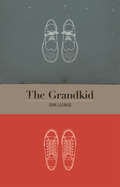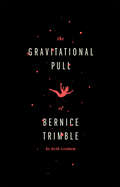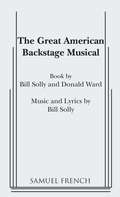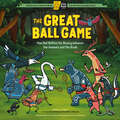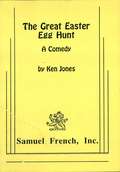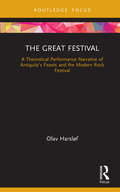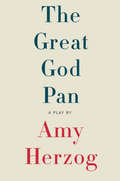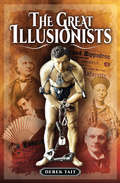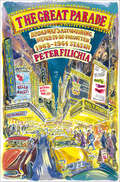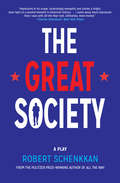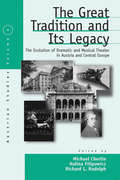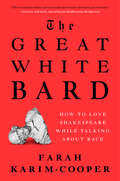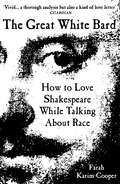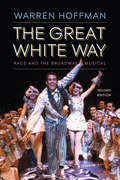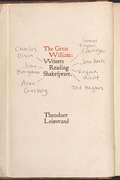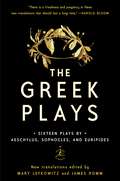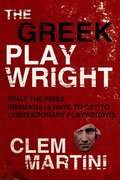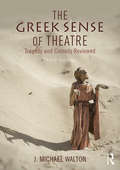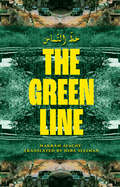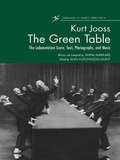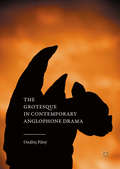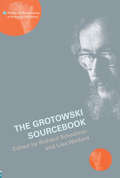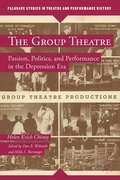- Table View
- List View
The Grandkid
by John LazarusJulius Rothstein and his granddaughter Abby have loved each other from opposite ends of Canada since Abby was born. But now, accepted as a freshman student at the university where Julius teaches, Abby is moving in with him to be close to school and to keep her newly widowed grandfather company. The two must negotiate a new relationship as housemates and friends, which means dealing with issues of youth and age, work and play, activism and apathy, homework and heart attacks, and those three tricky topics: sex, politics, and religion.
The Gravitational Pull of Bernice Trimble
by Beth GrahamIris Trimble is trying to hold it all together. She may very well fly off the face of the earth if she doesn't hang on to the kitchen counter. At least that's how she feels after her mother, Bernice, a lively, recently widowed fifty-nine-year-old breaks the news that she has Alzheimer's. In an effort to cope with the stress, Iris makes her mother's famous Everything That Is Bad For You Casserole, a childhood favourite. Her siblings, on the other hand, are on opposite sides of the spectrum: Sarah, the eldest, irately demands a second opinion, while Peter, the youngest, seems completely unfazed. As for Bernice, she's still as vivacious as ever, always up for a good laugh, and, most of all, ready to finally put herself first.
The Great American Backstage Musical
by Bill SollyThis funny, fast moving entertainment evokes the bright world of 1940s Hollywood musicals in which an obscure young singer and her equally obscure song writing boyfriend play out their romance against a theatrical background of auditions, misunderstandings, self sacrifice, overnight stardom and a full score of songs.
The Great Ball Game: How Bat Settles the Rivalry between the Animals and the Birds; A Circle Round Book (Circle Round)
by Rebecca SheirA classic folktale with roots in the traditional stories of many Indigenous peoples in North America, The Great Ball Game is adapted for today's kids by Rebecca Sheir, host of the award-winning Circle Round podcast. The stunning art of Joshua Mangeshig Pawis-Steckley, an Ojibwe woodland artist, along with creative activities, make this an engaging picture book that also fosters storytelling and promotes the values of diversity, acceptance, and understanding of others.
The Great Easter Egg Hunt
by Ken JonesComedy / 9m, 6f / Exterior / This comedy centers around an Annual Easter Egg Hunt. Citizens vie for the ultimate prize attainable in Umatilla, Florida the Golden Egg. Meanwhile Horseshoe and Clem Dumpling seek to avenge their shattered hopes of married bliss, the town flirt chases every man except for the one who is in love with her and two young lovers struggle to escape this small town. Judge Pulander officiates, but is soon overwhelmed by apple and cypress bark cider. The Rifle Association initiates a blood feud while the Women's Club fans the fire with gossip. The Great Easter Egg Hunt is a comic journey through one day in an isolated town that reflects the greed, cowardice, regret, avarice, love, stupidity, hope, passion and drama of life in America.
The Great Festival: A Theoretical Performance Narrative of Antiquity’s Feasts and the Modern Rock Festival
by Olav HarsløfThe Great Festival presents and analyzes two historical festivals - the ancient Dionysus Festival and the present Roskilde Festival. The purpose is to set up two comparable structures or 'codes' to explain the universal artistic effects, structures and fascination of the festival. Olav Harsløf argues that there are major structural, organizational and economic similarities which, when exposed, can give us greater insight into today's festivals. This is illuminated through a combined performance design and event analysis of the ancient Dionysus festival and today's Roskilde Festival, explaining the festival's historicity, diversity, complexity and paradigmatic strength. This will be a discussion of great interest to researchers and students in the fields of performance studies, experience economy, theater, music, classical philology and archeology.
The Great God Pan
by Amy Herzog"The Great God Pan is a haunting, deeply affecting play about the interaction of identity, psychology and pathology. Ms. Herzog writes with keen sensitivity to the complex weave of feelings embedded in all human relationships, with particular attention to the way we tiptoe around areas of radioactive emotion." - New York Times"Whatever the ideal contemporary American drama is, it has to look a lot like The Great God Pan. It is provocative and subtle, slowly, carefully revelatory, sweetly moving, thought-provoking, funny and insightful." - New York Observer"An intelligent, delicately articulate writer." - Village Voice"A moving and unsettling look at the nature of identity and the vagaries of memory. With subtlety and compassion, Herzog contemplates how well we can really know ourselves." - BackstageJamie's life in Brooklyn seems just fine: a beautiful girlfriend, a burgeoning journalism career, and parents who live just far enough away. But when a possible childhood trauma comes to light, lives are thrown into a tailspin. Unsettling and deeply compassionate, The Great God Pan tells the intimate tale of what is lost and won when a hidden truth is suddenly revealed.Amy Herzog's plays include 4000 Miles (Pulitzer Prize finalist), After the Revolution and Belleville. Ms. Herzog is the recipient of numerous awards, including the Whiting Writers' Award, an Obie Award and the Helen Merrill Award for Aspiring Playwrights.
The Great Illusionists
by Derek TaitHoudini and beyond: a historic magical mystery tour of the great showmen who inspired the likes of David Blaine, Penn & Teller, and Siegfried & Roy. Today, Harry Houdini stands as the most famous illusionist and escape artist in history. But from the late nineteenth century to early twentieth century, magicians and escapologists who inspired—and were inspired by—Houdini packed vaudeville houses and local theaters across the globe. The Great Illusionists reveals the careers, lives, and sometimes shocking on-stage deaths of the greatest showmen to ever wow the world. In addition to the astounding accomplishments of Houdini, marvel at the feats of Jean-Eugène Robert-Houdin, the “Father of Modern Conjuring”; the Davenport Brothers, music hall mediums and devotees of the Spiritualist movement; the “Dean of American Magicians” Harry Kellar; master illusionists, the Great Raymond, David Devant, the Great Lafayette, and Chung Ling Soo; the novelty performances of The Human Fly and Datas, “The Living Encyclopedia”; and many more. From vanishing acts and public seances to harrowing bullet-tricks and psychic wizardry, The Great Illusionists brings to life a unique history of entertainment.
The Great Parade: Broadway's Astonishing, Never-to-Be-Forgotten 1963–1964 Season
by Peter FilichiaIt was the Broadway season when Barbra Streisand demanded "Don't Rain on My Parade" and Carol Channing heard the waiters at the Harmonia Gardens say "Hello, Dolly!". From June 1, 1963 through the final day of May 31, 1964, theatergoers were offered 68 different productions: 24 new plays, 15 new comedies, 14 new musicals, 5 revivals of plays, 3 revues, 3 plays in Yiddish, 2 in French, 1 double-bill and even 1 puppet show. Peter Filichia's The Great Parade will look at what a Broadway season looked like a half-century ago analyzing the hits, the flops, the trends, the surprises, the disappointments, the stars and even how the assassination of JFK and the arrival of the Beatles affected Broadway.The Great Parade is a chronicle of a Broadway season unprecedented in the star power onstage: Barbara Streisand, Carol Channing, Claudette Colbert. Colleen Dewhurst, Hal Holbrook, Mary Martin, Christopher Plummer, Robert Preston, Julie Harris, Jason Robards, Jr., Carol Burnett, Tallulah Bankhead, Alec Guinness, Kirk Douglas, Albert Finney, Paul Newman, Joanne Woodward, Richard Burton, Mary Martin, Beatrice Lillie, Hermione Gingold, Robert Redford and many more. Neil Simon and Stephen Sondheim burst on to the Broadway stage with Barefoot in the Park and Anyone Can Whistle. The '63-'64 season was one of Broadway's greatest and in The Great Parade, Peter Filichia gives us another classic.
The Great Society: A Play (Books That Changed the World)
by Robert SchenkkanThis drama about LBJ’s 1960s War on Poverty “shines a bright, clear light on a pivotal moment in American history” (Charles Isherwood, TheNew York Times).The tumultuous beginning of Lyndon Johnson’s presidency that Robert Schenkkan presented in the multiple Tony-winning All the Way continues in part two, The Great Society, which had its world premiere at the Oregon Shakespeare Festival in July 2014, directed by Bill Rauch and starring Jack Willis. In the years from 1965 to 1968, President Lyndon Johnson struggles to fight a “war on poverty” even as his war in Vietnam spins out of control. Besieged by political opponents, Johnson marshals all his political wiles to try to pass some of the most important social programs in U.S. history, while the country descends into chaos over the war and backlash against civil rights. In the tradition of the great multi-part Shakespearian historical plays, The Great Society is an unflinching examination of the morality of power.“A taut political thriller…Schenkkan’s writing shines…a vital study for all those who wish to learn from the past in order to gain some idea of what we might do in the present.”?Austin American-Statesman
The Great Tradition And Its Legacy
by Michael Cherlin Richard L. Rudolph Halina FilipowiczBoth dramatic and musical theater are part of the tradition that has made Austria - especially Vienna - and the old Habsburg lands synonymous with high culture in Central Europe. Many works, often controversial originally but now considered as classics, are still performed regularly in Vienna, Prague, Budapest, or Krakow. This volume not only offers an excellent overview of the theatrical history of the region, it is also an innovative, cross-disciplinary attempt to analyse the inner workings and dynamics of theater through a discussion of the interplay between society, the audience, and performing artists.
The Great White Bard: How to Love Shakespeare While Talking About Race
by Farah Karim-CooperAs we witness monuments of white Western history fall, many are asking how is Shakespeare still relevant? Professor Farah Karim-Cooper has dedicated her career to the Bard, which is why she wants to take the playwright down from his pedestal to unveil a Shakespeare for the twenty-first century. If we persist in reading Shakespeare as representative of only one group, as the very pinnacle of the white Western canon, then he will truly be in peril. Combining piercing analysis of race, gender and otherness in famous plays from Antony and Cleopatra to The Tempest with a radical reappraisal of Elizabethan London, The Great White Bard asks us neither to idealize nor bury Shakespeare but instead to look him in the eye and reckon with the discomforts of his plays, playhouses and society. In inviting new perspectives and interpretations, we may yet prolong and enrich his extraordinary legacy.
The Great White Bard: How to Love Shakespeare While Talking About Race
by Farah Karim-CooperSHAKESPEARE: increasingly irrelevant or lone literary genius of the Western canon?'Powerful and illuminating' James Shapiro, author of 1599: A Year in the Life of William Shakespeare, winner of the Baillie Gifford 'Winner of Winners' 2023 Professor Farah Karim-Cooper grew up loving the Bard, perhaps because Romeo and Juliet felt Pakistani to her. But why was being white as a &‘snowy dove&’ essential to Juliet&’s beauty? Combining piercing analysis of race, gender and otherness in beloved plays from Othello to The Tempest with a radical reappraisal of Elizabethan London, The Great White Bard entreats us neither to idealise nor to fossilise Shakespeare but instead to look him in the eye and reckon with the discomforts of his plays, playhouses and society. If we persist in reading Shakespeare as representative of only one group, as the very pinnacle of the white Western canon, then he will truly be in peril. But if we dare to bring Shakespeare down from his plinth, we might unveil a playwright for the twenty-first century. We might expand and enrich his extraordinary legacy. We might even fall in love with him all over again. *** A TIME MAGAZINE BOOK OF THE YEAR 2023 'Insightful, passionate, piled with facts and has a warm, infectious love for theatre and Shakespeare running through every chapter.' ADRIAN LESTER, CBE 'Dive in and your whole cultural landscape will be refreshed and reframed... A challenging, riveting read, The Great White Bard reminds us how powerful the stories we tell can be on our lives.' ADJOA ANDOH 'Vivid… a thorough analysis but also a kind of love letter… Karim-Cooper sees Shakespeare as holding a mirror to this society, with his plays interrogating live issues around race, identity and the colonial enterprise… Her arguments come to feel essential and should be absorbed by every theatre director, writer, critic, interested in finding new ways into the work.&’ GUARDIAN 'There are plenty of books on Shakespeare: but this one is different. This is Shakespeare as we&’ve (most of us) never been willing to see him – and the works emerge from the analysis as newly complicit, powerful and yet recuperative.' EMMA SMITH, AUTHOR OF PORTABLE MAGIC
The Great White Way: Race and the Broadway Musical
by Warren HoffmanBroadway musicals are one of America’s most beloved art forms and play to millions of people each year. But what do these shows, which are often thought to be just frothy entertainment, really have to say about our country and who we are as a nation? Now in a new second edition, The Great White Way is the first book to reveal the racial politics, content, and subtexts that have haunted musicals for almost one hundred years from Show Boat (1927) to Hamilton (2015). This revised edition includes a new introduction and conclusion, updated chapters, as well as a brand-new chapter that looks at the blockbuster musicals The Book of Mormon and Hamilton. Musicals mirror their time periods and reflect the political and social issues of their day. Warren Hoffman investigates the thematic content of the Broadway musical and considers how musicals work on a structural level, allowing them to simultaneously present and hide their racial agendas in plain view of their audiences. While the musical is informed by the cultural contributions of African Americans and Jewish immigrants, Hoffman argues that ultimately the history of the American musical is the history of white identity in the United States. Presented chronologically, The Great White Way shows how perceptions of race altered over time and how musicals dealt with those changes. Hoffman focuses first on shows leading up to and comprising the Golden Age of Broadway (1927–1960s), then turns his attention to the revivals and nostalgic vehicles that defined the final quarter of the twentieth century. He offers entirely new and surprising takes on shows from the American musical canon—Show Boat (1927), Oklahoma! (1943), Annie Get Your Gun (1946), The Music Man (1957), West Side Story (1957), A Chorus Line (1975), and 42nd Street (1980), among others. In addition to a new chapter on Hamilton and The Book of Mormon, this revised edition brings The Great White Way fully into the twenty-first century with an examination of jukebox musicals and the role of off-Broadway and regional theaters in the development of the American musical. New archival research on the creators who produced and wrote these shows, including Leonard Bernstein, Jerome Robbins, Stephen Sondheim, and Edward Kleban, will have theater fans and scholars rethinking forever how they view this popular American entertainment.
The Great William: Writers Reading Shakespeare
by Theodore LeinwandThe Great William is the first book to explore how seven renowned writers--Samuel Taylor Coleridge, John Keats, Virginia Woolf, Charles Olson, John Berryman, Allen Ginsberg, and Ted Hughes--wrestled with Shakespeare in the very moments when they were reading his work. What emerges is a constellation of remarkable intellectual and emotional encounters. Theodore Leinwand builds impressively detailed accounts of these writers' experiences through their marginalia, lectures, letters, journals, and reading notes. We learn why Woolf associated reading Shakespeare with her brother Thoby, and what Ginsberg meant when referring to the mouth feel of Shakespeare's verse. From Hughes's attempts to find a "skeleton key" to all of Shakespeare's plays to Berryman's tormented efforts to edit King Lear, Leinwand reveals the palpable energy and conviction with which these seven writers engaged with Shakespeare, their moments of utter self-confidence and profound vexation. In uncovering these intense public and private reactions, The Great William connects major writers' hitherto unremarked scenes of reading Shakespeare with our own.
The Greek Plays
by Tony Kushner Ellen MclaughlinFrom The Persians"Defeat is impossibleDefeat is unthinkableWe have always been the favorites of fate.Fortune has cupped usIn her golden palms.It has only been a matterOf choosing our desire. Which fruitTo pick from the nodding tree."This chilling passage is from Ellen McLaughlin's new adaptation of The Persians by Aeschylus, the earliest surviving play in Western literature, an elegy for a fallen civi-lization and a warning to its new conqueror. As Margo Jefferson wrote in the New York Times, "The play is a true classic: we see the present and the future right there, inside the past. And when writers give us a 'new version' (a translation or adaptation) of a classic, they both serve and use it. They serve the playwright's gifts by refusing to simplify. But they can't just imitate. Every age has its own rhythms and drives. The classic must make us feel the new acutely. Ellen McLaughlin serves and uses The Persians with true power and grace."Also included in this volume: Iphigenia and Other Daughters (from Euripides and Sophocles); The Trojan Women (Euripides); Helen (Euripides); and Lysistrata (Aristophanes), all powerfully realized and as relevant today as when they were first performed.Ellen McLaughlin's plays include Days and Nights Within, A Narrow Bed, Infinity's House and Tongue of a Bird, which have been widely produced. She is a past finalist for the Susan Smith Blackburn Prize and was the co-winner of the Great American Play Contest. Also an accomplished actor, Ms. McLaughlin is most known for having originated the part of the Angel in Tony Kushner's Angels in America, appearing in every U.S. production through its Broadway run.
The Greek Plays: Sixteen Plays by Aeschylus, Sophocles, and Euripides
by Sophocles Aeschylus Euripides James Romm Mary LefkowitzThe great plays of Ancient Greece are among the most enduring and important legacies of the Western world. Not only is the influence of Greek drama palpable in everything from Shakespeare to modern television, the insights contained in Greek tragedy have shaped our perceptions of the nature of human life. Poets, philosophers, and politicians have long borrowed and adapted the ideas and language of Greek drama to help them make sense of their own times. <p><p> This exciting curated anthology features a cross section of the most popular—and most widely taught—plays in the Greek canon. Fresh translations into contemporary English breathe new life into the texts while capturing, as faithfully as possible, their original meaning. <p> This outstanding collection also offers short biographies of the playwrights, enlightening and clarifying introductions to the plays, and helpful annotations at the bottom of each page. Appendices by prominent classicists on such topics as “Greek Drama and Politics,” “The Theater of Dionysus,” and “Plato and Aristotle on Tragedy” give the reader a rich contextual background. A detailed time line of the dramas, as well as a list of adaptations of Greek drama to literature, stage, and film from the time of Seneca to the present, helps chart the history of Greek tragedy and illustrate its influence on our culture from the Roman Empire to the present day. <p> With a veritable who’s who of today’s most renowned and distinguished classical translators, The Greek Plays is certain to be the definitive text for years to come.
The Greek Playwright: What the First Dramatists Have To Say To Contemporary Playwrights
by Clem MartiniPicking up where The Blunt Playwright left off, Clem Martini returns to the subject of playwriting, turning his attention to the lessons modern playwrights can learn from the ancient Greeks. Outlining the major playwrights of the era, their major works, and the impact they had on our modern understanding of drama, Martini weaves his direct, informative, and entertaining style through centuries of dramatic evolution to show us exactly what the first dramatists have to say to contemporary playwrights.
The Greek Sense of Theatre: Tragedy and Comedy
by J Michael WaltonIn this updated and extended edition of The Greek Sense of Theatre, scholar and practitioner J.Michael Walton revises and expands his visual approach to the theatre of classical Athens. From the tragedies of Aeschylus, Sophocles and Euripides to the old and new comedies of Aristophanes and Menander, he argues that while Greek drama is seen now as a performance-based rather than a strictly literary medium, more attention should still be paid to the nature of stage image and masked acting as part of this conception.
The Green Line | خطّ التماس
by Makram AyacheA poetic, heartbreaking story of intergenerational queer history in Lebanon, The Green Line weaves together civil war Beirut with a contemporary nightclub, following one family’s journey to discover their past.In the present day, Rami, a twentysomething queer Lebanese Canadian, has returned to the Lebanese mountains to bury his father. To cope with the weight of his grief, Rami, carrying a necklace in the shape of a phoenix left to him by his father, finds himself in a queer Beirut nightclub, where he catches the attention of a powerful drag queen named Fifi, who just so happens to be dressed as a phoenix.In 1978, in the midst of the Lebanese Civil War, Naseeb is attempting to get himself and his sister Mona out of Beirut and into the safety of the mountains. Mona, however, is secretly in love with her classmate, a woman named Yara, and refuses to leave the city. When Naseeb becomes swept up with the descending political culture of the war around him, he creates a rift between himself and Mona greater than the line that divides the country itself.
The Green Table: The Labanotation Score, Text, Photographs, and Music
by Ann Hutchinson Guest* Score, photographs, and production details of one of this century's best-loved ballets * Includes rare archival material * Packaged with audio CD This work brings together the complete dance score of The Green Table--one of the most famous ballets of the 20th century--in Labanotation, along with music notation for the piano accompaniment and a complete recording of the accompaniment on CD. It also includes several essays about the work and its genesis, and many historic production photographs. This book is an important item for all colleges with dance programs to own in their libraries and for scholars interested in the study of contemporary dance.
The Grotesque in Contemporary Anglophone Drama
by Ondřej PilnýGrotesque features have been among the chief characteristics of drama in English since the 1990s. This new book examines the varieties of the grotesque in the work of some of the most original playwrights of the last three decades (including Enda Walsh, Philip Ridley, Tim Crouch and Suzan-Lori Parks), focusing in particular on ethical and political issues that arise from the use of the grotesque.
The Grotowski Sourcebook (Worlds of Performance)
by Richard Schechner Lisa Wolford WylamThis acclaimed volume is the first to provide a comprehensive overview of Jerzy Grotowski's long and multi-faceted career. It is essential reading for anyone interested in Grotowski's life and work.Edited by the two leading experts on Grotowski, the sourcebook features:*essays from the key performance theorists who worked with Grotowski, including Eugenio Barba, Peter Brook, Jan Kott, Eric Bentley, Harold Clurman, and Charles Marowitz*writings which trace every phase of Grotowski's career from his 'theatre of production' to 'objective drama' and 'art as vehicle'*a wide-ranging collection of Grotowski's own writings, plus an interview with his closest collaborator and 'heir', Thomas Richards*an array of photographs documenting Grotowski and his followers in action*a historical-critical study of Grotowski by Richard Schechner.
The Group Theatre
by Milly S. Barranger Helen Krich Chinoy Don B. WilmethThe Group Theatre , a groundbreaking ensemble collective, started the careers of many top American theatre artists of the twentieth century and founded what became known as Method Acting. This book is the definitive history, based on over thirty years of research and interviews by the foremost theatre scholar of the time period, Helen Chinoy.
